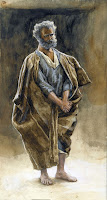 |
"The
Charity of St. Martin" -- by Louis Anselme Longa
|
Saint Martin of Tours (also known as Martin the Merciful; The Glory of Gaul) was born around 316 A.D. at Upper Pannonia (in modern Hungary) of pagan parents. His father was a Roman military officer and tribune.
Saint
Martin was raised in Pavia, Italy. He discovered Christianity, and
became a catechumen in his early teens. He was baptized into the
Church at the age of 18.
He
joined the Roman imperial army at the age of 15, serving in a
ceremonial unit that acted as the emperor's bodyguard, and was rarely
exposed to combat. He became a cavalry officer, and was assigned to
garrison duty in Gaul (modern France).
Once,
while on horseback in Amiens in Gaul , he encountered a beggar.
Having nothing to give but the clothes on his back, he cut his
officer's cloak in half, and gave it to the beggar. He later had a
vision of Christ wearing the cloak.
Just
before a battle, Martin announced that he was Christian, and that his
faith prohibited him from fighting. This resulted in his being
charged with cowardice, he was jailed, and his superiors planned to
put him in the front of the battle. The invaders sued for peace, the
battle never occurred, and Martin was released from military service
at Worms.
After
he was released he journeyed to Poitiers to labor under Saint
Hilary, Bishop of Poitiers. There he organized a community of
monks, erected the monastery of Liguge, and in 371 became Bishop of
Tours. He later founded the monastery of Marmoutier and resided
there. He was an opponent of Arianism.
After
a last visit to Rome, Martin went to Candes, one of the religious
centers created by him in his diocese, where he died in 397. By his
request, he was buried in the Cemetery of the Poor on 11 November 397
and his relics rested in the basilica of Tours until 1562 when the
cathedral and the saints relics were destroyed by militant
Protestants.
Some
fragments of his tomb were found during construction excavation in
1860.
An
extensive biography of Martin was written by Saint Sulpicius Severus.
Martin of Tours was the first non-martyr to receive the cultus of a
saint.
* * * * * * *
Below
is an excerpt from a letter by Saint Sulpicius Severus on Saint
Martin of Tours:
Martin
knew long in advance the time of his death and he told his brethren
that it was near. Meanwhile, he found himself obliged to make a
visitation of the parish of Candes. The clergy of that church were
quarreling, and he wished to reconcile them.
Although
he knew that his days on earth were few, he did not refuse to
undertake the journey for such a purpose, for he believed that he
would bring his virtuous life to a good end if by his efforts peace
was restored in the church.
He
spent some time in Candes, or rather in its church, where he stayed.
Peace was restored, and he was planning to return to his monastery
when suddenly he began to lose his strength. He summoned his brethren
and told them he was dying. All who heard this were overcome with
grief. In their sorrow they cried to him with one voice: “Father,
why are you deserting us? Who will care for us when you are gone?
Savage wolves will attack your flock, and who will save us from their
bite when our shepherd is struck down? We know you long to be with
Christ, but your reward is certain and will not be any less for being
delayed. You will do better to show pity for us, rather than forsake
us.”
Thereupon
he broke into tears, for he was a man in whom the compassion of our
Lord was continually revealed. Turning to our Lord, he made this
reply to their pleading: “Lord, if your people still need me, I am
ready for the task; your will be done.”
Here
was a man words cannot describe. Death could not defeat him nor toil
dismay him. He was quite without a preference of his own; he neither
feared to die nor refused to live. With eyes and hands always raised
to heaven he never withdrew his unconquered spirit from prayer. It
happened that some priests who had gathered at his bedside suggested
that he should give his poor body some relief by lying on his other
side. He answered: “Allow me, brothers, to look toward heaven
rather than at the earth, so that my spirit may set on the right
course when the time comes for me to go on my journey to the Lord.”


